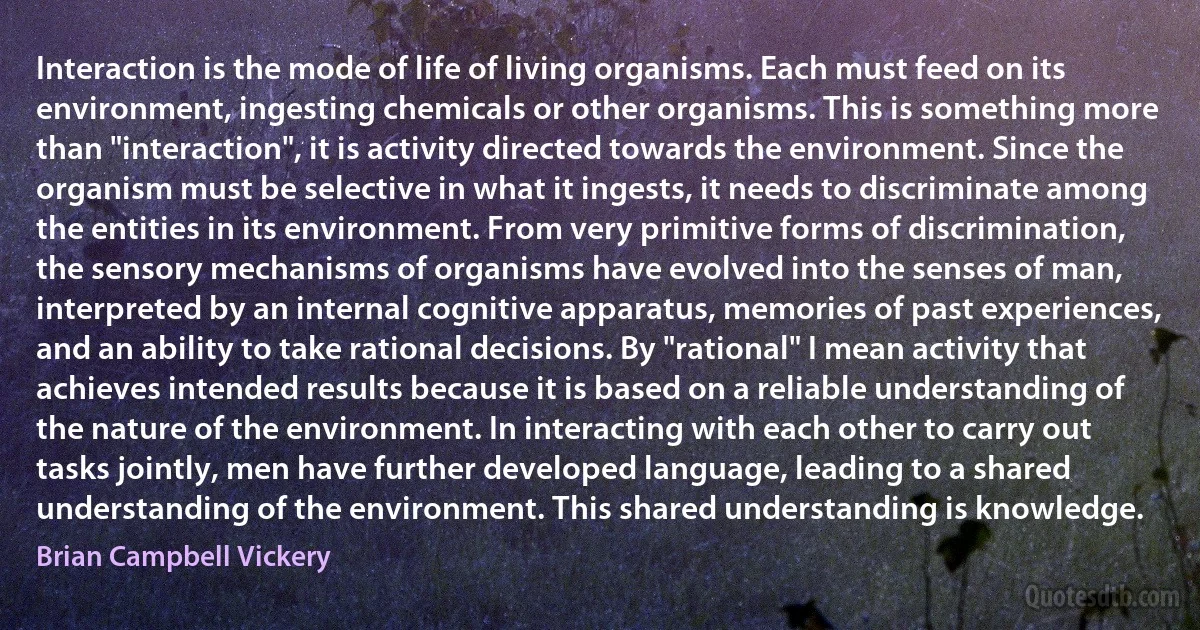
Interaction is the mode of life of living organisms. Each must feed on its environment, ingesting chemicals or other organisms. This is something more than "interaction", it is activity directed towards the environment. Since the organism must be selective in what it ingests, it needs to discriminate among the entities in its environment. From very primitive forms of discrimination, the sensory mechanisms of organisms have evolved into the senses of man, interpreted by an internal cognitive apparatus, memories of past experiences, and an ability to take rational decisions. By "rational" I mean activity that achieves intended results because it is based on a reliable understanding of the nature of the environment. In interacting with each other to carry out tasks jointly, men have further developed language, leading to a shared understanding of the environment. This shared understanding is knowledge.
Brian Campbell VickeryRelated topics
ability apparatus carry cognitive discrimination feed interaction men knowledge language life living man mean nature needs organism past primitive reliable sensory something take understanding chemicalsRelated quotes
To avoid misunderstanding, it may be proper to say that this proclamation, so far as it relates to State governments, has no reference to States wherein loyal State governments have all the while been maintained. And for the same reason, it may be proper to further say that whether members sent to Congress from any State shall be admitted to seats, constitutionally rests exclusively with the respective Houses, and not to any extent with the Executive. And still further, that this proclamation is intended to present the people of the States wherein the national authority has been suspended, and loyal State governments have been subverted, a mode in and by which the national authority and loyal State governments may be re-established within said States, or in any of them; and, while the mode presented is the best the Executive can suggest with his present impressions, it must not be understood that no other possible mode would be acceptable.

Abraham Lincoln
The rights of the individual are of no less importance to immigrants and minorities in Europe and the Americas than to women in Afghanistan or children in Africa. They are as fundamental to the poor as to the rich; they are as necessary to the security of the developed world as to that of the developing world.
From this vision of the role of the United Nations in the next century flow three key priorities for the future: eradicating poverty, preventing conflict, and promoting democracy. Only in a world that is rid of poverty can all men and women make the most of their abilities. Only where individual rights are respected can differences be channelled politically and resolved peacefully. Only in a democratic environment, based on respect for diversity and dialogue, can individual self-expression and self-government be secured, and freedom of association be upheld.

Kofi Annan
The most immediate result of this unbalanced specialisation has been that to-day, when there are more "scientists" than ever, there are much less "cultured" men than, for example, about 1750. And the worst is that with these turnspits of science not even the real progress of science itself is assured. For science needs from time to time, as a necessary regulator of its own advance, a labour of reconstitution, and, as I have said, this demands an effort towards unification, which grows more and more difficult, involving, as it does, ever-vaster regions of the world of knowledge. Newton was able to found his system of physics without knowing much philosophy, but Einstein needed to saturate himself with Kant and Mach before he could reach his own keen synthesis. Kant and Mach - the names are mere symbols of the enormous mass of philosophic and psychological thought which has influenced Einstein.

José Ortega y Gasset
After the war, Japan was occupied by the allied forces, and based on peace and democracy as values to be upheld, established the Constitution of Japan, undertook various reforms and built the foundation of Japan that we know today. I have profound gratitude for the efforts made by the Japanese people at the time who helped reconstruct and improve the country devastated by the war. I also feel that we must not forget the help extended to us in those days by Americans with an understanding of Japan and Japanese culture. Today, more than sixty years since the end of the war, we have seen that, in the face of major disasters such as the Great East Japan Earthquake [March 11, 2011], there are so many people in Japan who value the bonds between people, can deal with various situations calmly, and work hard towards reconstruction. I have found this most reassuring.

Akihito
The word 'policy' generally refers to the principles that govern action directed towards given ends. Any study of policy therefore should concern itself with three things - what we want (the ends), how we get it (the means), and who are 'we,' that is, what is the nature of the organization or group concerned. Science is concerned with means rather than with ends. The study of "what we want" (objectives) extends beyond the boundaries of the social sciences into the field of ethics. It is not the business of the social sciences to evaluate the ultimate ends of human activity. The social sciences, therefore, cannot give a final answer to the question whether any given policy is right. The social scientist can study what people say they want, what they think they want and may even infer from their behaviour what they really want, but it is not the business of science to say whether people want right things.

Kenneth Boulding
